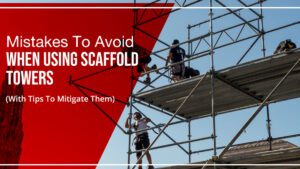Common Scaffold Tower Mistakes and How to Avoid Them

A scaffold tower is an independent scaffold that consists of pre-fabricated scaffold components. These components are connected to build an accessible and movable system. These towers are used in heavy-duty on-site applications (like, installing ceiling fittings), where standard ladders aren’t enough.
The scaffold towers have multiple advantages, including-
- Greater height, stability, and strength
- Easy assembly and disassembly
- High versatility
- Light in weight and movable
- High durability
- Made with non-corrosive materials
However, these advantages can be jeopardized if the safety rules are compromised. This blog shall infer on most common mistakes made while handling scaffold towers along with some safety tips.
Most common mistakes when using a scaffold tower
Here are some mistakes that scaffolders should avoid when using scaffold towers.
1. Introducing heavy objects on the tower to increase its height
The ascent and descent using your access scaffolding equipment could be time-consuming. Given this, it is understandable why one could be tempted to use any available object, such as a chair or a plastic box, to increase their height. We understand the temptation, but it does not mean we believe you should give in to it.
A dependable stepladder, for instance, is not intended for usage atop an access tower, but rather on the ground. Using unanticipated items such as chairs or crates could place you in a perilous scenario. Keep away from the hazards!
2. Using the scaffold tower when there are heavy winds
We are not claiming that scaffold towers are incapable of withstanding heavy winds; this is frequently considered during the design phase. While the weather deteriorates, it is risky to perform work at a height when the wind speed is high.
If the winds become too strong, you should delay your work. The power of the wind alone may throw you off balance, and it could also send pebbles, dust, and other small objects at you at the worst possible moment. Avoid becoming one of the thousands of employees who have died from falls from a height during the past five years.
Moreover, scaffolding is prone to several hazards at construction sites which can be prevented if adequate care is taken during and after its construction.
3. Not calculating the safe working load
Like ladders, scaffolding towers have a maximum weight capacity that must be observed. Thankfully, the vast majority of people can escape the grave danger of exceeding a ladder’s weight capacity. Keep everything on the scaffold tower for a short time, as removing it could compromise the platform. A fall of tools or materials could pose a hazard to those below.
4. Buying cheap scaffold towers
When it comes to accessing equipment, you should always invest a bit more than you would normally. In fact, we previously discussed on the blog why you should always invest in a quality ladder, and it boils down to the same principle: if you’re dedicating your life to it, you should never settle for a low-cost one.
5. Scaffolders are untrained
Understanding the structure of the site and how to operate the relevant equipment is crucial for every construction worker. On scaffolding, untrained personnel is less likely to identify danger warnings, be aware of their surroundings, and wear fall protection.
At first glance, scaffold towers may appear more sturdy and durable than ladders, but do not assume they can sustain the same weight or power. Avoid jumping up and down or throwing heavy objects from a great height; they were designed to support the weight of a person standing still and making steady, planned movements.
6. Neglecting the external dangers
When a scaffold tower is constructed, it can reach heights so magnificent that they are almost intimidating. At this height, there is a high potential for electrical operations to be hazardous. Even though injuries experienced in this manner are typically less serious, the damage caused by high voltages could result in fatalities if not addressed prior to the commencement of operations.
Safety tips when using scaffold towers
To avoid the above mistakes, here are some safety tips.
- Use safety equipment and PPE kits
- Take note of load limits
- Know construction regulations and standards
- Inspect scaffolding materials
- Build the scaffold tower by following the manual provided by the scaffolding supplier
- Inspect the site and equipment every day before starting work
- Keep vehicles and heavy equipment clear
- Stay organized
- Mind the weather condition
- Be fully licensed
- Train scaffold users
Bonus tip: Scaffolding safety tags
Tags on scaffolding indicate whether or not it is safe to use. A competent individual (as determined by OSHA) is required to inspect and label the scaffold structure. Three distinct types of scaffolding tags exist:
Green scaffold tags– The presence of a green tag on a scaffold indicates that it has been examined and is safe to use. Upon completion of the initial inspection, it should be affixed to all access points.
Yellow scaffold tags– The presence of yellow scaffold tags indicates particular requirements for safe use, i.e., the scaffold has been changed to match existing work requirements, and it may pose a safety risk to all users.
Red scaffold tags– The presence of a red tag on a scaffold indicates that the structure is dangerous for use. These tags are frequently utilized when scaffolding is being installed or disassembled.
These tags are provided by scaffolding accessories supplier that helps in distinguishing the safety levels while working.
Avoid Mistakes For Safer Construction Works
There are mistakes that can be avoided on the construction site. Scaffold towers, being multipurpose scaffolds, are mostly taken for granted. Hence, it becomes important to be aware of the common mistakes and tips to avoid any flaws or injuries.
AAIT is a leading scaffolding accessories supplier in the USA. We provide top-notch scaffolding components and scaffold towers that meet OSHA regulations. From ringlock scaffold towers to movable and non-movable scaffold towers, all are available.
Get in touch with us to avail towers from the best scaffolding distributor in the USA that provides maximum safety.












 Download
Download